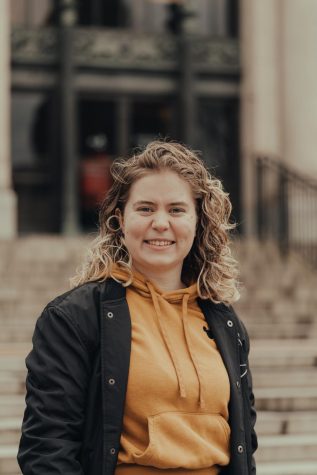Petition from OSU alumni demands university be held accountable
A petition for SARC, the Survivor Advocacy and Resource Center, which serves as the first point of contact for survivors and their allies.
November 10, 2021
Clarification: a line about what SARC has done to help OSU alumni Coral Avery has been updated to provide more clarification
Content warning: mentions of sexual assault
A petition created to bring awareness to the lack of resources in the Survivor Advocacy and Resource Center calls on Oregon State University to support SARC with requested resources.
“OSU’s SARC exists to support students, faculty and staff who have been impacted by interpersonal violence,” the first line of the petition stated. “Over the years, several students have presented written or in-person complaints to SARC and Student Health Services for not adequately addressing their concerns and for victim-blaming survivors reaching out for support.”
The petition also demands that a conversation be opened between OSU, SARC staff and the larger campus community to discuss what OSU will do to better support survivors and provide SARC with the resources they ask for.
Coral Avery, the creator of this petition and an OSU alumni who graduated last year, said they started this petition as a way to bring awareness to the OSU and Corvallis communities. Avery said they hope the petition will incite changes at OSU that will create a community of care for survivors and actually hold perpetrators accountable.
“If OSU is providing these resources and prioritizing survivors, then it’ll make for a safer environment, so I’m hoping this petition will help lead to a conversation between SARC and the appropriate group at OSU,” Avery said.
According to Jenny Haubenreiser, associate vice provost for Student Affairs and executive director of SHS, SARC’s budget mostly comes from the Division of Student Affairs with SHS providing for expenses such as space, equipment and travel.
“I understand that questions and concerns have been expressed about the level of financial support for SARC and resources for survivors,” Haubenreiser said. “We appreciate the concern and care people hold for survivors. It is important for community members to know that the university is committed to survivor support.”
Haubenreiser added that SARC is a department within SHS that works closely with other university offices and programs such as Counseling and Psychological Services, the Student Care Team in the Office of the Dean of Students and the Office of Equal Opportunity and Access.
“It is through this broad network of care [that] OSU is able to provide the most effective support for survivors and their allies,” Haubenreiser said.
According to Haubenreiser, there is no current data that survivors seeking support from SARC are not being served.
“We also recognize that there are survivors who are not comfortable reaching out for service, are not aware of services or do not feel the services offered are available for them,” Haubenreiser said. “Thus, as a community, there is always more to do.”
Being a survivor themselves and open about their experience with SARC, Avery said the ways they’d been let down when reaching out for support dealt mostly with systemic issues in the way cases are dealt with, rather than individual problems with SARC.
“I know that nobody has had a perfect experience with any of these resource centers either,” Avery said. “And I think… it has been in the past at individual levels with some of the staff that have been there… but mostly it’s the systemic changes that need to happen, so that’s why this petition is really calling on OSU to focus on the systemic changes.”
After creating the petition, Avery said they’d also heard from other survivors who shared similar stories and experiences facing challenges with resource centers on campus.
“They’re either still fighting for justice in their cases, or they were never allowed that opportunity, or they never reported at all because they knew that they couldn’t trust the systems that were in place,” Avery said.
Despite these systemic issues, Avery said SARC and many of the people in SARC were helpful and supportive of their situation.
Avery said SARC helped them communicate with their professors so they could complete their courses and remain on the path to graduation.
“I don’t want it to come across that there are evil people working in these places necessarily,” Avery said. “There are some amazing people working at SARC, or that are now leaving SARC as well.”
According to Avery, SARC and other resource centers on campus are still underfunded and unable to properly support survivors because of this.
“[The petition] is really demanding that those conversations happen, and that change is made because… there’s so many articles already, so many failed cases, so many times that people have raised their voices about the issues that are happening over the years and nothing has been done,” Avery said.
Haubenreiser said SHS encourages community and student input.
“Discussion of staffing needs for SARC has been underway for the past year,” Haubenreiser said. “Concerns related to SARC staffing that were made in the spring during public forums prompted an institutional review of OSU’s interpersonal violence response that was conducted last spring.”
According to Haubenreiser, OSU had determined that a comprehensive approach, strengthened through a partnership with the Center Against Rape and Domestic Violence, focused on prevention, support and response will help to meet survivor needs.
Even though Avery’s petition focuses mostly on SARC and its resources, they said the petition is a call out for every resource center on campus that responds to interpersonal violence.
“There are ways all of them can be improved structurally to help the staff that are working there provide for survivors and for students that need support,” Avery said. “They can also be restructured or resources allocated in a way that better create that community of care for survivors, too. That’s the real hope.”

























































































































